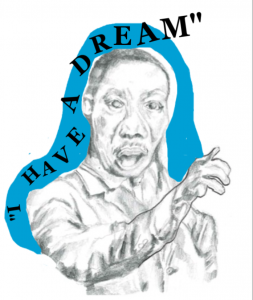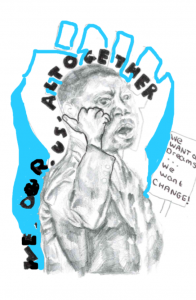Have inequalities between the rich and poor been exposed and exacerbated or given our stereotypical society a chance to change for the better?
Where are you from? This lingering question is always asked- a subtle sense of conformation is present in the light-hearted conversation. ‘I’m from the Caribbean’ I exclaim and upon reading their confused glance, I add Usain Bolt, Rihanna, Beyonce- everyone knows Usain Bolt. Gold medalist. Sprinter. The world’s fastest man. But they do not know the history of diversification within the Olympic games with countries competing from Japan to Jamaica, India to Italy, New Zealand to the Netherlands. The list is endless. The question is why aren’t we taught about black history and how we had to fight for our place on Earth, let alone the Olympic Games. Ask yourself, how have you gotten to where you are today? Your brother, your sister, your friend, your colleague- we all come from different backgrounds and why is this? Black people have been in Britain since Roman times, although their circumstances have differed. As a result of the British Empire, slavery was common where the owners selected whom they wanted to enslave based on their appearance and Afro-Caribbean and African slaves would be ferried to work on plantations under the scorching, sweltering, searing sun. This was inhumane. Few people managed to escape and would flee to the East End of London and lived in deprivation and poverty. So how has this led to inequality in the 21st century?
HOW DOES A STUDENT’S BACKGROUND IMPACT THEIR EDUCATION?
Perhaps you live in London or South- East England. In these areas, we as a society are granted access to learn which will provide us with the qualifications and opportunities required for a job. For example, from January 2020, many students across the nation have had to work from home due to Covid-19 and social distancing measures- many students have access to their efficient, effective devices that we can use anywhere from in the classroom to home. Look around, we all use our own devices whether it is the shiny, sleek new ‘iPad’, where you can complete tasks in a simple tap or the digital display on your laptop to present your latest work. Many people may even be reading this article on a device. Unfortunately, this is not the case for many students who do not come from wealthy socioeconomic backgrounds with many even living in deprivation and poverty. This is a difficult hurdle for some students who come from working or lower class backgrounds and do not have a stable income- this has been exacerbated during lockdown because a high proportion of students do not have the resources and facilities to study, particularly university students who face grueling exams. There is a high proportion of students at a disadvantage and this ultimately creates more inequality because the students’ grades impact their job chances, with 14 percent of ethnic minorities unemployed. This impacts their economic income and may lead to people living in deprivation and poverty.
THE HISTORY OF THE BRITISH EMPIRE AND COLONIALISM- HOW THIS HAS IMPACTED OUR SOCIETY TODAY:
The UK has an influx of opportunities available from charity and voluntary work to becoming a doctor or lawyer with many ethnic minorities migrating to the UK in the hope of finding a job and having access to these opportunities, however, the affluence and significance of the UK would not be what it is today without colonisation and establishing overseas settlements specifically within the Middle East and South Asia where many valuable goods were commonly found. The British Empire colonised many countries such as New Zealand, Afghanistan, South Africa, and Jamaica. This has led to inequalities because of the lack of goods in these countries exacerbated people’s living conditions. This resulted in many living in poverty and this led to financial consequences including the exploitation of raw materials such as tobacco and sugar in addition to dependence on the UK for trade.
Martin Luther King Jr-1963.

“Let us honor the victims of the slave trade by remembering their struggle. Let us carry it forward until no person is deprived of liberty, dignity, and rights”.
The colonisation and inhumane slave trade from the 17th century has led to how children and adults from racially stigmatised and ethnic minority groups, which serve 20 percent of the UK’s population, face inequalities and are stereotyped as a result of how black minorities were treated throughout the slave trade- these forms of racism are even more pertinent amongst young children who are not educated thoroughly on black history and are therefore vulnerable to racism’s harmful effects. For example, racial disparities and inequality have been shown from everyday life to education and health including criminal justice processes. Belly Mujinga was assaulted whilst working at the front line for transport for London. Not only did she have underlying respiratory conditions, but she had no PPE which was vital for her despite recent data stating that ‘Black, Asian and ethnic minority groups are at higher risk from the virus’. Additionally, in 2011, Kingsley Burrell died whilst being detained by police at a mental health unit. No successful prosecutions were made. Sheku Bayoh, a father to two young sons, was detained and did not leave police custody alive. The list of promising lives lost is endless.
It is time for racial inequality to stop and we get the justice and rights which should be essential. Despite how 20 percent of ethnic minorities live in the UK, 9 percent of people of a black race are unemployed, the highest amongst all ethnic minority groups in addition to how despite the ‘Windrush’ and how many people from the Caribbean arrived in the UK from 1948 and 1973 with the majority taking up jobs in labor and the NHS, we are still not treated equally. International migrants are a significant part of the NHS as are the doctors and nurses who look after the nation- 13.3 percent of NHS staff in England were from a non-British nationality. There is inequality with international migrants working in the NHS because migrants are charged with high visa fees despite how the UK has stated policies to support international migration into the health service, and how migrants are a vital part of the health care sector. The NHS has lost a huge number of its workers due to Covid-19 and this is because over half of health care who died were migrants and deaths among black communities have been disproportionately high.

Public Health England Report: “People from ethnic minorities are at higher risk of dying from coronavirus’’.
There is inequality here because despite how ethnic minorities are more likely to suffer from Covid-19, they are not provided with sufficient PPE. Without this, the NHS, the light which is taking us to the end of this tunnel, may not be as successful in times like these when we need health services most. These inequalities do not only have a devastating impact on black lives, but it impacts us more than we know, specifically the health of those who contract Covid-19 because we do not have the doctors and nurses needed. It is not enough to just not be racist- you have to be actively anti-racist.
THE EDUCATION SYSTEM
Civil rights. The cotton industry. The 1619 slave trade. Rosa Parks. Martin Luther King Jr. This is just a small grain of what can be taught in the school curriculum- schools and teachers have the responsibility of ensuring that children have respect and tolerance for all cultures. This needs to start at a young age and it needs to start now. Our resources, our blood, and our sweat has bought the UK economy to what it is today, so why is this not acknowledged? Not only is black history part of our education, our knowledge of the past, and what we are taught but this is to help us learn from our mistakes and break away from the stereotypical society before us. This impacts how we treat people, our thoughts, and how we interact with people. For example, institutional racism is shown and there is no doubt about it-in 2017/18 alone 94,098 hate crimes were recorded by police in England and Wales, 76 percent were racially aggravated. Additionally, fewer than 1 percent of university professors are black- racism is so ingrained into our society that we do not even know it. The amount the British Empire and slave trade added to Britain’s economy is unmistakable- not teaching this is breaking us further apart from bringing change into our society. Why is black history only given one month of the year when for four hundred years we have been fighting and have endured an uphill battle for our place on earth, our rights, our lives, our loved ones, our place in society- most importantly our own identity.
THE START OF A CHANGE
We as a society have made a start, including the removal of the slave traders’ statues of those who committed inhumane acts of piracy throughout the slave trade to build Britain’s economy. For example, the slave trade statue of Robert Milligan was removed from outside the ‘Museum of the London Docklands’- this essentially creates solidarity because people are owning up to this part of history. It is important that people keep signing petitions, attending protests, and donating to ensure that our voices are constantly heard. We will never be silenced from having our rights. This is only the start of an uphill battle to fight for our country, our rights and our identity, so strap in, and in the words of Martin Luther King Jr’s 1963 speech we shall hope that our children of generations will:
“one day live in a nation where they will not be judged by the color of their skin, but by the content of their character”.
It is now time that we changed our hopes into actions and we put the ‘equal’ in ‘inequality’.
Gabriella Nero
Featured image courtesy of author.

